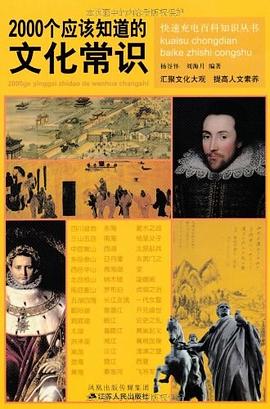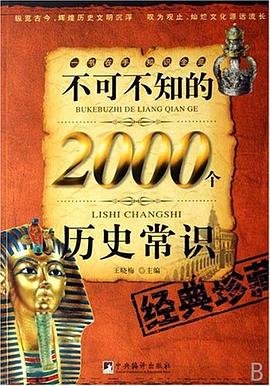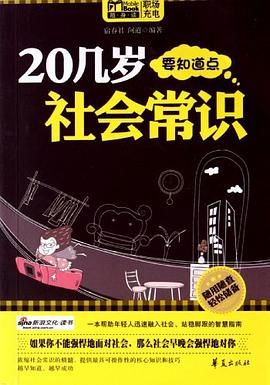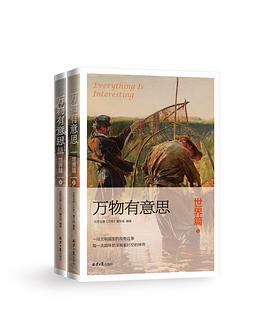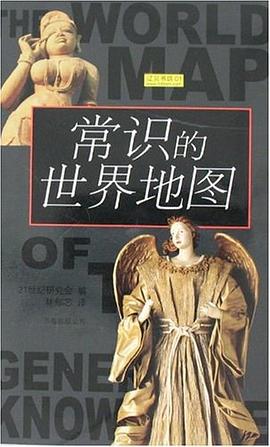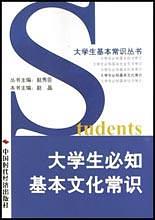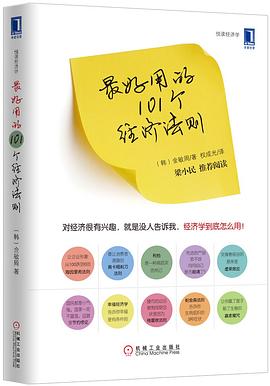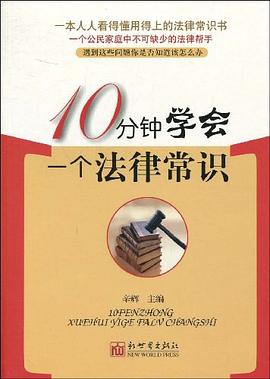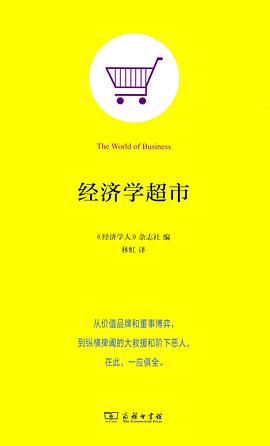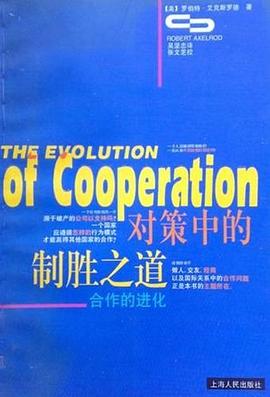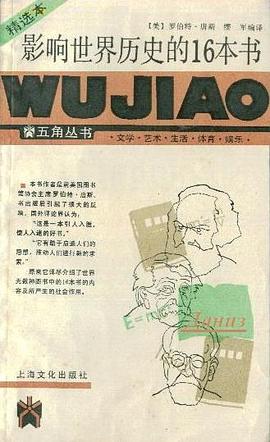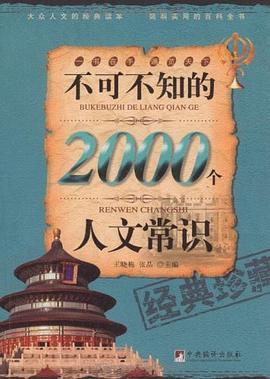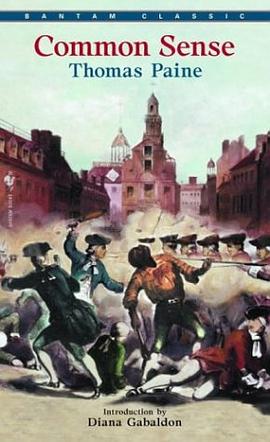

具体描述
When Common Sense was published in January 1776, it sold, by some estimates, a stunning 150,000 copies in the colonies. What exactly made this pamphlet so appealing? This is a question not only about the state of mind of Paine's audience, but also about the role of public opinion and debate, the function of the press, and the shape of political culture in the colonies. This Broadview edition of Paine’s famous pamphlet attempts to reconstruct the context in which it appeared and to recapture the energy and passion of the dispute over the political future of the British colonies in North America. Included along with the text of Common Sense are some of the contemporary arguments for and against the Revolution by John Dickinson, John Adams, and Thomas Jefferson; materials from the debate that followed the pamphlet's publication showing the difficulty of the choices facing the colonists; the Declaration of Independence; and the Pennsylvania Constitution of 1776.
作者简介
Thomas Paine was born in Norfolk, England, on January 29, 1737. He received a basic education in history, mathematics, and science, but left school at age 13 to apprentice in his father's corsetmaking shop. In 1757, he spent time at sea aboard the privateer ship King of Prussia, and later found employment as a journeyman staymaker in London. All the while, Paine continued to study on his own, influenced by the work of two leading figures of the Enlightenment, Isaac Newton and John Locke. He began writing political pamphlets, and at the urging of Benjamin Franklin, emigrated to Philadelphia in 1774 to work as an editor for The Pennsylvania Magazine. In 1776, he published Common Sense, which called for America's political freedom from England. The pamphlet sold more than 150,000 copies in three months. Paine next published The American Crisis during the Revolutionary War, inspiring George Washington to read it to his troops at Valley Forge. By the end of the Revolution, however, Paine's influence had run its course, and he fell out of political favor. He returned to Europe, where he published his treatise Rights of Man, which led to his arrest on charges of high treason. Disillusioned with life abroad, he returned to the U.S. to find himself vilifed as an agitator and atheist. He died in obscurity in New York City in 1809.
Diana Gabaldon is the New York Times bestselling author of five previous novels -- Outlander, Dragonfly in Amber, Voyager,
目录信息
读后感
首先,翻译得太差了。 改天等自己英文进步的时候再看英文版的。 书中论述的政府、人与社会的关系大概是人人都能看懂的。我现在明白为什么美国人时时刻刻处处讲自由民主人权,因为他们的国家就是在这样的思考下诞生的。 相比之下,我们的国家似乎因为历史的悠久反而丧失了思考的...
评分其实,早就听说过《常识》这本书。刘瑜和李海鹏的杂文集里都会提到托马斯潘恩和这本号称改变世界的20本书之首的小册子。读罢这本书,才明白为什么它能有如此的盛赞。 这本书诞生于1776年,距今200多年了。读这本书,必须结合当时的历史来。18世纪后叶,北美殖民...
评分潘恩的思想无疑是先进的,可<独立宣言>竟然没他什么份儿,开国元勋中也没他的名字。他一生都在辩论,和所有的当权者辩论,我不知道这样说有没有错。 或者说他是一个改革者,要改革所有的旧势力,包括他的创新与发明就是这样。 在创新思想方面,他无疑是一位天才...
评分 评分首先,翻译得太差了。 改天等自己英文进步的时候再看英文版的。 书中论述的政府、人与社会的关系大概是人人都能看懂的。我现在明白为什么美国人时时刻刻处处讲自由民主人权,因为他们的国家就是在这样的思考下诞生的。 相比之下,我们的国家似乎因为历史的悠久反而丧失了思考的...
用户评价
这本书散发着一种近乎狂热的理想主义气息,但这种理想主义并非建立在空中楼阁之上,而是扎根于对人性的深刻洞察。作者似乎完全不相信任何形式的世袭权力,他认为权力天然地应该来自于被统治者的同意。书中关于“联合”的讨论,尤其引人深思。他并没有把焦点仅仅放在“反抗”上,而是巧妙地将“独立”描绘成一种必然的、甚至是更符合逻辑的“结合”方式,这是一种更高维度的统一。我尤其喜欢他用各种生动的类比来解释复杂的政治概念,比如将政府比作钟表,强调其维护的必要性和运作的机械性,这种清晰的框架构建,让原本抽象的政治理论变得触手可及。它不是那种需要反复研读才能领悟的学术巨著,而更像是一份写给所有有理性的人的公开信,充满了对人类理性的基本信任和期许。这种信任感,是推动社会变革最核心的动力之一。
评分这本书的开篇就给我一种强烈的时代感,仿佛穿越回了那个政治思潮涌动不安的年代。作者的论证逻辑严密得令人称奇,他没有沉溺于华丽的辞藻或空泛的口号,而是像一个冷静的工程师,一步步拆解着君主制度的根基。我特别欣赏他对“自然权利”的阐释,那种直击人心的力量,即便是今天读来,也依然能激发人对自由与平等的思考。全书的语言是如此的直白有力,没有多少晦涩难懂的哲学思辨,却能将最深刻的政治理念用最普通人的语言表达出来。这使得它超越了精英阶层的讨论,真正成为了一份“常识”的宣言。阅读过程中,我时常停下来,回味那些掷地有声的论断,思考它们在当时环境下产生的巨大冲击力。它不仅仅是一本政治小册子,更像是一剂强心针,注入了当时渴望变革的民众心中,点燃了他们对独立和自治的渴望。书中对于建立一个基于理性与人民福祉的政府的构想,即便在今天看来,依然具有重要的借鉴意义,它提醒着我们,政治的本质应当回归到服务于个体的基本需求与权利上来,而不是建立在血统或神授的虚妄之上。
评分整本书的节奏把握得极佳,由浅入深,层层递进,充分体现了作者作为一名宣传家的卓越才能。起初,他从对当前局势的普遍不满切入,迅速建立起与读者的情感共鸣;随后,他开始系统性地拆解君主制的合法性,这部分论证显得格外坚实和不可动摇。我注意到,作者在论述中几乎没有使用过多的法律术语或宗教典故,而是反复强调“常识”、“理性”和“人类的共同利益”。这种对普世价值的坚持,是其力量的源泉。读完后,你会感觉自己仿佛被说服了,不是被强迫的,而是自己主动得出了这个结论。它成功地将一场政治诉求,转化成了一场全民的精神觉醒运动。这种“潜移默化”的教育效果,远超任何枯燥的官方法令,因为它直接作用于人们内心深处的道德判断和逻辑感知,让人不得不去思考:我们凭什么服从?我们又该如何生活?
评分此书的叙事风格非常鲜明,带着一种饱满的、不容置疑的自信,这种自信并非源于傲慢,而是源于作者对自身立论的绝对把握。书中对于未来新政府结构的构想,虽然简略,但勾勒出了一个简洁、高效且权力制衡的框架。它让人看到,摆脱旧有枷锁后,一个崭新的政治实体是完全可以实现的,而且是可以运转良好的。我欣赏它对细节的关注,比如对海军、商业以及外交政策的简要提及,这表明作者的思考是全方位的,并非只停留在推翻旧政权这一阶段。它提供的是一个完整的行动纲领,一份关于如何构建未来生活的“操作手册”。可以说,这本书的价值在于,它为那些犹豫不决、渴望变革却又缺乏方向的人们,提供了一份清晰、鼓舞人心且逻辑自洽的路线图,极大地降低了推翻现有体制所需付出的思想成本和心理阻力。
评分读罢此书,我最大的感受是其语言的犀利与不留情面。作者对于英格兰国王乔治三世及其政府的批评,简直是毫不掩饰的直接抨击,毫不拖泥带水,仿佛是用一把最锋利的刻刀在雕刻那些陈腐的弊端。他剖析了殖民地与宗主国之间关系的荒谬性,那种“母子关系”的比喻,初听有些诙谐,细想却透着一股无奈的辛酸与对不公的愤慨。书中对现状的描绘是如此的鲜活而具体,让人能够清晰地想象出当时民众在经济和政治上所遭受的压制。这种不加修饰的风格,极大地增强了文本的说服力,因为它不试图取悦任何人,只是单纯地陈述一个被扭曲的事实。更令人印象深刻的是,作者在批判旧体系的同时,也提出了一个相当务实且具有前瞻性的新体系蓝图——关于共和制政府的设想。这种将破坏与建设并行的叙事方式,使得整部作品的张力十足,既有对过去弊端的清算,更有对未来可能性的热切展望。
评分头两章形而上地用文字跳舞,之后便如篇毕业论文般晦涩啰嗦,毕竟很难与独立战争之前的殖民地民众心理或其对立面感同身受。但是一些地缘政治学、政治经济学的理论体系雏形放在那个时代已经是非常先进的了。
评分如果不结合历史背景整体只能说一般吧,字面上潘恩简直是迷之自信
评分a rabble-rouser
评分两趟飞机读完,可见灯塔国光辉肇始,但确实絮絮叨叨...
评分A long habit of not thinking a thing wrong gives it a superficial appearance of being right.
相关图书
本站所有内容均为互联网搜索引擎提供的公开搜索信息,本站不存储任何数据与内容,任何内容与数据均与本站无关,如有需要请联系相关搜索引擎包括但不限于百度,google,bing,sogou 等
© 2026 book.wenda123.org All Rights Reserved. 图书目录大全 版权所有




